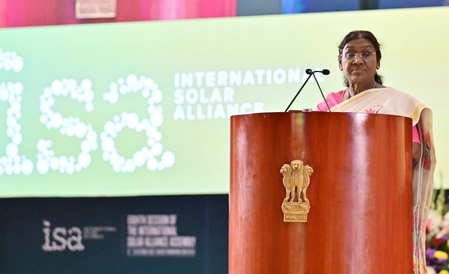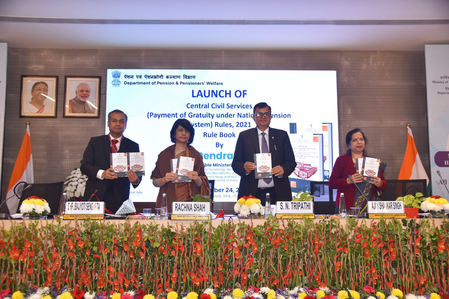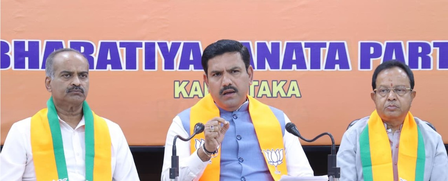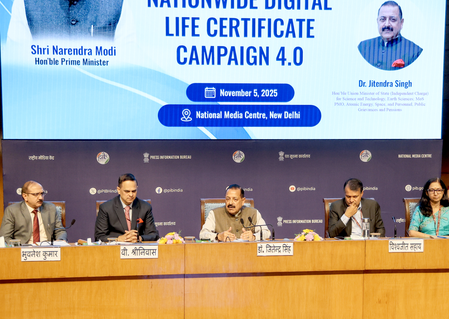
New Delhi, Oct 28 (IANS) President Droupadi Murmu said on Tuesday that by 2050, India aims not only to meet its clean energy targets but also to become a hub that aggregates global solar demand and drives innovation, manufacturing and knowledge exchange.
Addressing the eighth session of the assembly of the International Solar Alliance (ISA) at the Bharat Mandapam here, President Murmu affirmed that India is on track to become a global solar energy hub.
She highlighted the country’s progress in achieving renewable energy targets ahead of schedule and outlined a vision for aggregating global solar demand and driving clean energy innovation.
The President said that the ISA stands as a symbol of humanity’s shared aspiration — to harness solar energy as a source of inclusion, dignity, and collective prosperity.
The President urged all Member Countries to think beyond infrastructure and focus on lives of the people. She said that this Assembly should develop a collective action plan that links solar energy with job creation, women’s leadership, rural livelihoods, and digital inclusion.
“Our progress should not only be measured through megawatts but through the number of lives illuminated, the number of families strengthened, and the number of communities transformed. The focus should also be on technology development and on sharing latest and advanced technologies with all for maximum benefit,” the President remarked.
The President said that climate change is affecting the entire world. Urgent and concrete steps need to be taken to deal with this threat. India is committed to combating climate change and is taking determined steps. She highlighted that ISA represents a significant step towards addressing this global challenge by encouraging the adoption and use of solar energy.
She said that the idea of inclusion defines India’s development journey. The country’s experience in illuminating homes in the remotest areas, confirms our belief that energy equity is the foundation of social equity. Access to affordable and clean energy empowers communities, drives local economy, and opens up opportunities that extend well beyond the provision of electricity. She said that solar energy is not merely about power generation but also about empowerment and inclusive development.
President Murmu emphasised that the expansion of large-scale solar installations should also ensure that the ecological balance of the region is preserved as environment conservation is the very reason for turning to green energy.
The President further stated that we should work with more dedication not only for our own countries but for the entire world and not only for the present generation but for the future generations. She expressed confidence that the deliberations and decisions of this Assembly will act as a milestone in the production of solar energy which will contribute in building an inclusive and equitable world.
Speaking on the occasion, Minister of Consumer Affairs and New and Renewable Energy, Pralhad Joshi, highlighted India’s remarkable renewable energy journey — from being a marginal player to the world’s 4th largest in renewable energy capacity, growing from 81 GW in 2014 to 257 GW to date.
“Under the visionary leadership of Prime Minister Narendra Modi, India achieved it’s target of 50 per cent energy capacity from non-fossil sources, 5 years ahead of the 2030 target, making clean energy accessible and affordable,” the minister told the gathering.
Through transformative initiatives like PM-KUSUM, PM Surya Ghar Muft Bijli Yojana, PM-JANMAN and ‘One Sun, One World, One Grid’, India is leading efforts to ensure energy justice, empower the poorest, and strengthen South-South cooperation, Joshi added.
The ISA, led by India, is a treaty-based intergovernmental organization that aims to enable a solar-powered future, with a special focus on the energy needs of developing nations
–IANS
sps/na




